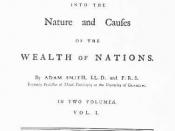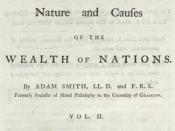This essay will firstly define a 'free market' then by using course materials it will discuss the possible environmental impacts of a 'free market' and what can be done to limit them.
A free market is a market 'â¦where price is determined by the unregulated interchange of supply and demand. This is in contrast to a controlled market where supply, demand, and price are set directly by government' (Wikipedia). In a free market, the economy has to decide what quantities of food, mobile phones or banking services should be produced and how many trees need to be felled to meet the demand for pulp for newspapers and magazines. It also has to decide how they produce their goods for example how many employees, where their company is based and who their suppliers will be. All these decisions are important factors related to environmental impacts.
Adam Smiths book "The Wealth of Nations" explains how free markets work and in which he explained the workings of an "invisible hand".
The invisible hand is a metaphor for the way markets work. The actions of economic agents are driven by self interests to the good of all people (Goldblatt, 2004).
However, the forces of market supply and demand, without any government intervention, determine how resources are allocated. What to produce is decided upon by the profitability for a particular product. For example, when demand for a product is high, the price rises and this raises the profitability of selling in the market. One paradigm is the world price for coffee. If a bad harvest results in a shortage of coffee then the price of the coffee rises. Consumers calculate how much they are willing to pay and producers decide what and how much should be produced.
Deforestation is a prime example of supply and...


